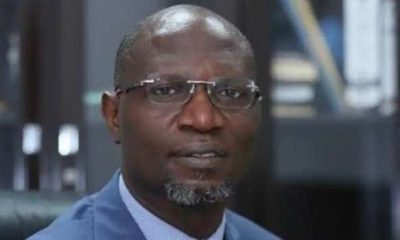Business
Cryptocurrency: Nigeria changes course, opts for regulation

…as clampdown falters
Nigeria’s Federal Government last week, said it was planning to introduce licences for providers of virtual assets, including crypto-currencies, as part of its efforts to safeguard investors; an announcement, which has set off spirited conversations about the future of crypto in Africa’s most populous country and largest economy, where it has continued to attract mass adoptions despite government crackdown.
In an interview publish by Bloomberg on Tuesday, Dr. Emomotimi Agama, Director-General of Nigeria’s Securities and Exchange Commission (SEC), disclosed that the first set of licences for digital services and tokenized assets could be issued as early as this month.
“Being a crypto and fintech enthusiast, I can tell you this is going to happen sooner than expected. We must support the youth of this country in harnessing the benefits that fintech offers. The market is vast and continues to grow,” Agama said.
The SEC DG further explained that this regulatory initiative positions Nigeria alongside other global markets, such as the European Union, South Africa, and Botswana, which have already implemented measures to regulate digital assets.
Addressing the Central Bank of Nigeria’s (CBN) ban on banks facilitating cryptocurrency transactions, Agama noted that the ban stemmed from concerns over exchange rate manipulation and the naira’s depreciation, emphasizing that the SEC’s decision to introduce licences reflects the need for a structured and transparent environment, where digital transactions can be safely conducted.
When Nigeria’s federal government under President Bola Tinubu in February began sudden clampdown on cryptocurrency trade in response to the massive fall of the naira at the parallel market, restricting access to crypto exchanges, and ultimately, arresting two Binance executives, Tigran Gambaryan – who remains in detention – and Nadeem Anjarwalla – who has since fled the country – many traders, who spoke to Business Hallmark, dismissed the effort as a waste of time. They insisted that like the attempt by the proceeding administration of Muhammadu Buhari, the new clamp-down would not stop them from the trade.
Six months down the road, the jury is out. Nigeria’s crypto market has continued to blossom in the shadows, even as a new tapping craze has swept through its shores with millions of impoverished populace historically attempting to tap their way out of poverty in the wave of Telegram based games now favoured by promoters of new crypto projects to reach potential adopters.
Speaking earlier at the 2024 Annual Conference of the Association of Capital Market Academics of Nigeria (ACMAN) in June in Abuja, Dr. Agama, had noted Nigeria’s cryptocurrency market is estimated to be worth over $400 million.
The SEC DG, who spoke on theme, “Crypto Assets and the Nigerian Economy: Implications for Financial Markets Regulation,” had remarked that a “significant portion of the population is involved in cryptocurrency trading and transactions”, predicting that the market volume “will reach $525 million by 2028”, representing “a 12.66 percent increase from 2024 to 2028”
Agama had admitted that despite economic challenges, Nigeria has “emerged as one of the leading countries globally in terms of crypto adoption and volume of transactions”.
Speaking further, he said, “Reports indicate that Nigeria’s crypto transaction volume reached $56.7 billion between July 2022 and June 2023, representing a nine percent year-over-year growth.
CBN’s decision to clampdown on crypto trade in February helped to halt what was already shaping up to be a total collapse of the local currency, a trend that began when the President Tinubu administration opted to float exchange rate a week after his inauguration, as president in May 2023. From the rate of N470 to the dollar, the currency had begun to dance on the brink of N2,000 to the dollar by February before the clampdown helped to halt the slide.
The widespread use of Peer-To-Peer (P-2-P) exchange mostly on Binance, allowed sellers to arbitrarily fix prices of naira, which contributed to its rapid fall. However, while the clampdown, which forced Binance – the leading global crypto exchange used by a vast majority of traders in Nigeria – to discontinue the trading of the naira against bitcoin and tether crypto-currencies on its exchange platform, helped to slow down the slide, it, ultimately, failed to stop crypto trade, as traders only moved to other exchanges like Kucoin, Bybit, and so on, where they exchanged their naira for tether on P-2-P exchange, away from the prying eyes of the government, which could neither adequately monitor it, or tax the transactions.
Agama’s announcement indicates that the government has come to terms with the inevitability of crypto coming to stay, which could see the trade integrated into the banking system to be better regulated and taxed.
Experts assert that the government could be motivated by two broad objectives, one being to better monitor illicit financial flow, which full integration of crypto exchanges into the banking system could guarantee, and two, to gain much needed revenue by taxing crypto trade.
Agama had acknowledged that challenges persist within the crypto space, including concerns over illicit activities, regulatory uncertainty, security concerns, and financial literacy, while noting that, “A balanced regulatory approach is essential to harness the benefits of crypto assets while mitigating risks.”
Speaking at an event last week, Mr. Zacch Adedeji, chairman of Federal Inland Revenue Service (FIRS), identified as a potential fiend to explore in the agency’s audacious revenue target of N19.4trn for 2024.
“We set a target of N19.4 trillion ($12 billion) for ourselves this year. We are almost in the third quarter of the year and with the figure we are seeing so far, I can say we are on the part of achieving our target,” he had said.
On crypto, Adedeji emphasized that, “We cannot run away from the cryptocurrency ecosystem, because it is the in-thing. We need a law that regulates that area of our economy.”
Potential benefits
“For instance, we all can see how India maturely handled the issue with Binance over alleged operating as a reported entity without registration by imposing a $2.25 million fine.
“That marks a significant milestone to crypto regulation. That is what Nigeria should do instead of allowing the Exchage’s executive languish in jail – an action, which does not earn the country a dime.
“After settling the India’s impasse, Binance described it as an achievement, which marks its 19th global regulatory milestone and underscores its commitment to adhering to anti-money laundering (AML) standards and fostering a secure, transparent, and efficient ecosystem.”
Experts on the crypto space have welcomed the Idea of regulation as the best way to move forward, but warn that heavy taxation would be counterproductive, as it would crowd out indigenous competition and discourage traders from using formal channels.
“When it comes to exchanges, you don’t really need physical presence to operate in any country. So, when SEC say they want to regulate crypto, I think they want to basically set the rules by which you can have access to Nigerian banking system. If you have a license, you can interact with the Nigerian banking system. You may be required to collect certain data in line with anti money laundering laws. You may also be required to have a point person or a liaison office,” said Peter Iyen, crypto trader.
Iyen, who spoke on Arise TV on Friday, cautioned, however, that revenue ought not be the key driver, as according to him, if the tax becomes prohibitive, it won’t be healthy for the market.
“The amount of money the government will be able to collect as licensing fees is not going to be prohibitive. I think the government wants to crypto market to grow responsibly because no country is going to allow crypto to be used for money laundering. So, I don’t think the primary motive is revenue. Yes, some revenue will be generated, but in the ground scheme of things, I hope it’s not huge because we also want our own local exchanges to grow,” he said.
“They have seen that crypto is here to stay. In the P2P system, I could be interacting with someone, who is a terrorist without knowing. Now, unknown to me, I could be facilitating a crime. But when this regulation comes in, I’ll be interacting with my bank and my bank will be interacting with the cryptocurrency exchange. It kind of takes care of that criminal element.
“I know we had interaction with the banks before, but that was unregulated and still prone to money laundering. I hope the government comes up with the legal framework that works, but not make it about revenue generation. Because that would lock away the local players, who won’t be able to compete with global juggernauts like Binance.”
On his part, Ola Atoshe, the Chief Executive Officer of KoinKoin Exchange noted that regulation means that his company can secure the license to operate in Nigeria.
“We’ve been hopeful for regulation in this space, and we’re finally happy that we’re finally getting to a point where some of us will finally get a licence to operate here in Nigeria,” he said.
“I think the time has come for Nigeria to finally join other jurisdictions and regulate crypto. There’s a robust framework in place, which the SEC has worked on over the past year, which will provide safety to our users and also provide safety to ourselves as cryptocurrency exchanges.”
“There’s is need for us as Nigerians to have a unified stance on cryptocurrency, I mean by all the regulatory bodies with SEC leading the pace, and FIRS and CBN and others. What we would like to see is all these regulatory bodies coming together and agreeing on how to proceed with cryptocurrency.”
Mark Nduagibe, another crypto trader, while fielding questions from reporters at a recent event in Lagos, also made a case for regulation.
He said, “what we are trying to do is to show Nigerians that crypto is not magic, it’s not ponzi, rather it is a standard, genuine technological trading system. As the world is experiencing an evolving landscape of crypto regulation, we want Nigeria to be counted as early adopters.








